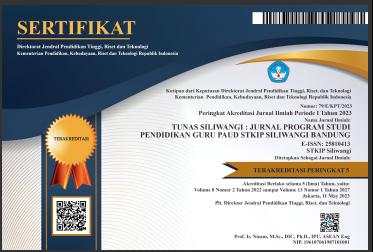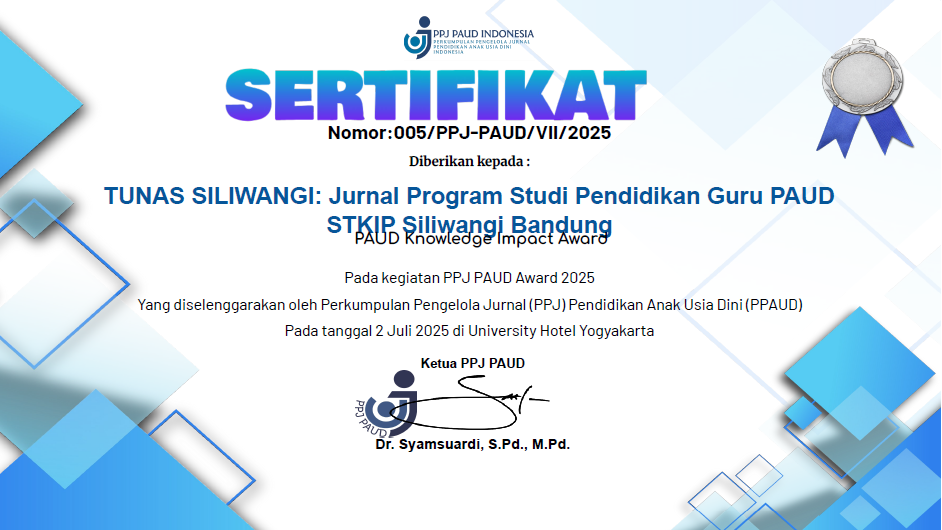PSYCHOLOGICAL WELL-BEING GURU PENDIDIKAN ANAK USIA DINI KOTA BANDUNG PADA SAAT PANDEMI COVID-19
DOI:
https://doi.org/10.22460/ts.v7i1p%25p.2105Abstract
The purpose of this study was to determine the psychological well-being description of Early Childhood Education (PAUD) teachers in Bandung. The sample used was 168 PAUD teachers in Bandung. The research approach used is quantitative research with survey research methods. The data collection technique used is by distributing questionnaires via google form. Based on the results of the study, it was found that the psychological well-being level of early childhood teachers in Bandung during the Covid-19 pandemic was 17.3% in the high category, 72.6% in the medium category, and 10.1% in the low category. In addition, there are different levels of psychological well-being in every aspect, both in the aspects of self-acceptance, positive relationships with others, autonomy (independence), environmental control, goals, and self-growth.
Tujuan penelitian ini yaitu untuk mengetahui gambaran psychological well-being guru Pendidikan Anak Usia Dini (PAUD) se Kota Bandung. Sampel yang digunakan yaitu 168 guru PAUD kota Bandung. Pendekatan penelitian yang digunakan yaitu penelitian kauntitatif dengan metode penelitian survey. Adapun teknik pengumpulan data yang digunakan adalah dengan menyebarkan kuesioner melalui google form. Berdasarkan hasil penelitian diperoleh bahwa tingkat psychological well-being guru PAUD se Kota Bandung pada saat pandemi covid-19 yaitu 17,3% pada kategori tinggi, 72,6% pada kategori sedang, dan 10,1% pada kategori rendah. Selain itu terdapat perbedaan tingkat psychological well-being pada setiap aspeknya, baik dalam aspek penerimaan diri, hubungan positif dengan orang lain, otonomi (kemandirian), penguasaan lingkungan, tujuan, dan pertumbuhan diri.
Â
Â
References
Agustin, M., Puspita, R. D., Nurinten, D., & Nafiqoh, H. (2020). Tipikal Kendala Guru PAUD dalam Mengajar pada Masa Pandemi Covid 19 dan Implikasinya. Jurnal Obsesi: Jurnal Pendidikan Anak Usia Dini, 5(1), 334-345.
Ayuni, D., Marini, T., Fauziddin, M., & Pahrul, Y. (2020). Kesiapan Guru TK Menghadapi Pembelajaran Daring Masa Pandemi Covid-19. Jurnal Obsesi: Jurnal Pendidikan Anak Usia Dini, 5(1), 414-421.
Bradburn, N.M. (1969). The Structure of Psychological Well-Being. 1969. Chicago: Aldine Publishing Company.
Center for Disease Control and Prevention. (2015). Well-being Concept.
Creswell, J. W., & Creswell, J. D. (2017). Research design: Qualitative, quantitative, and mixed methods approaches. Sage publications
Khan, A., Khan, S., Zia-Ul-Islam, S., & Khan, M. (2017). Communication Skills of a Teacher and Its Role in the Development of the Students’ Academic Success. Journal of Education and Practice, 8(1), 18–21.
Maiza, Z., & Nurhafizah, N. (2019). Pengembangan Keprofesian Berkelanjutan dalam Meningkatkan Profesionalisme Guru Pendidikan Anak Usia Dini. Jurnal Obsesi :Jurnal Pendidikan Anak Usia Dini, 3(2), 356. https://doi.org/10.31004/obsesi.v3i2.196
Rizal Setyo Nugroho (2020). Diakses pada tanggal 14/03/2020 https://www.kompas.com/tren/read/2020/03/14/120000765/corona-421-juta-pelajar-di-39-negara-belajar-di-rumah-kampus-di-indonesia?page=all
Ryff, C. D. (1989). Beyond Ponce de Leon and life satisfaction: New directions in quest of successful aging.International Journal of Behavioral Development, 12, 35–55.
Ryff, C. D., & Keyes, C. L. M. (1995). The structure of psychological well-being revisited. Journal of personality and social psychology, 69(4), 719.
Seligman, M. (2002). Authentic happiness: Using the new positive psychology to realize your potential for lasting fulfillment. New York: Free Press.
Downloads
Published
Issue
Section
License
Copyright (c) 2025 Tita Rosita, Maya Masyita Suherman

This work is licensed under a Creative Commons Attribution-ShareAlike 4.0 International License.
The author is responsible for acquiring the permission(s) to reproduce any copyrighted figures, tables, data, or text that are being used in the submitted paper. Authors should note that text quotations of more than 250 words from a published or copyrighted work will require grant of permission from the original publisher to reprint. The written permission letter(s) must be submitted together with the manuscript.






